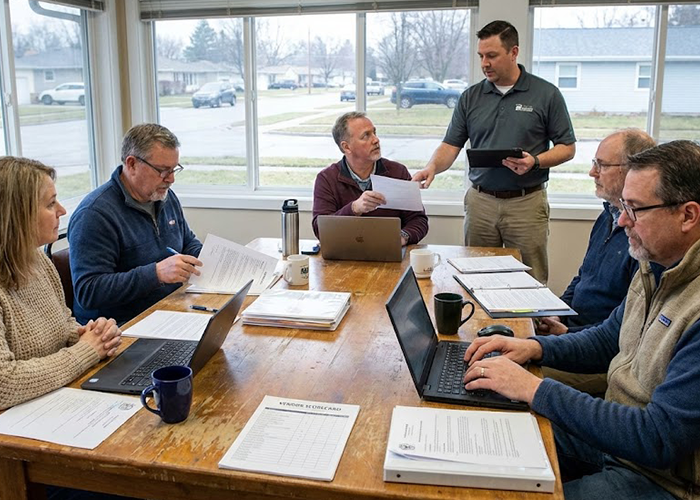HOA Meeting Minutes Mistakes: Bad Practices To Avoid

HOA meeting minutes are the official record of board meetings, documenting key discussions, decisions, and action items. Properly maintained minutes ensure transparency, accountability, and legal protection for the HOA. However, common HOA meeting minutes mistakes can lead to confusion, disputes, and even legal challenges.
Browse By Category
Sign up for Our Newsletter
HOA meeting minutes are the official record of board meetings, documenting key discussions, decisions, and action items. Properly maintained minutes ensure transparency, accountability, and legal protection for the HOA. However, common HOA meeting minutes mistakes can lead to confusion, disputes, and even legal challenges.
The Role of HOA Meeting Minutes
Before diving into common mistakes, you must first understand the purpose of HOA meeting minutes. Minutes don’t technically serve as the transcript of the meeting. Instead, it’s a summary of key discussions, decisions, and action items. They should provide an objective record that any homeowner, board member, or legal professional can review to understand what was decided and why.
Meeting minutes serve several important functions:
- Transparency: Homeowners have a right to understand how board decisions are made.
- Accountability: Board members can be held responsible for decisions and commitments made during meetings.
- Legal Protection: Properly maintained minutes can serve as legal evidence if the HOA faces a dispute.
- Continuity: Minutes ensure that future boards can refer to past decisions to maintain consistency.
Given the importance of meeting minutes, errors or manipulations in their recording can have serious consequences.
Common HOA Meeting Minutes Mistakes and Their Impact
1. Adding Personal Opinions or Editorialising
HOA meeting minutes should remain neutral and factual. You shouldn’t include personal opinions, interpretations, or emotional language. Adding commentary or bias can create disputes, misrepresent board decisions, and damage the HOA’s credibility.
Here’s a bad entry example:
“The treasurer, as usual, was hesitant to approve the budget, causing unnecessary delays.”
Instead, you can use this:
“The treasurer requested additional time to review the budget before approval.”
Adding subjective language can cause division among the board and homeowners, leading to distrust and complaints.
2. Failing to Accurately Record Votes and Decisions
One of the most critical functions of HOA meeting minutes is documenting votes and decisions. Failing to record these properly can create confusion and legal vulnerabilities. Minutes should clearly state:
 The motion made
The motion made- Who made the motion
- Who seconded the motion
- The results of the vote (including how each board member voted)
Here’s a bad example:
“The board discussed raising HOA fees and generally agreed on an increase.”
Here’s the correct approach:
“A motion was made by [Board Member’s Name] to increase HOA fees by 5%. The motion was seconded by [Board Member’s Name]. The vote was as follows: 3 in favor, 2 opposed. The motion carried.”
Inaccurate vote recording can lead to challenges from homeowners and even legal disputes.
3. Being Selective About What to Include
One major problem in some HOAs is secretaries choosing what to include or exclude based on personal preference. Minutes should be an objective record, not a tool for shaping narratives or protecting certain board members.
For example, if a board member raises concerns about a vendor’s performance but the secretary omits this discussion from the minutes, homeowners and future board members may not fully understand the board’s decision-making process.
Impact:
- Homeowners may feel misled or kept in the dark.
- Board members may face accountability issues later when no record exists of their concerns.
- Legal disputes may arise if no documentation of discussions led to a decision.
4. Failing to Record Homeowner Comments (If Required by Law or Bylaws)
Many HOAs allow homeowners to speak during meetings, particularly during open forums. While every word does not need to be transcribed, a summary of homeowner concerns should be recorded.
Avoid doing this:
(No mention of homeowner concerns in the minutes)
Instead, write this as the entry:
“Three homeowners expressed concerns about landscaping maintenance. The board acknowledged the concerns and will discuss solutions at the next meeting.”
If homeowner concerns are not documented, they may feel ignored, leading to frustration and distrust in the HOA board.
5. Including Too Much Detail
While omitting key information is problematic, the opposite can be just as harmful. Some secretaries write excessively detailed minutes, turning them into near-transcripts. This can lead to unnecessary conflicts and legal risks.
Here’s a bad example:
“Board Member A said, ‘I don’t trust that contractor,’ and Board Member B responded, ‘That’s ridiculous.’ Heated arguments followed.”
Here’s the correct approach:
“The board discussed concerns about the contractor’s performance and considered alternative options.”
Excessive detail can lead to misunderstandings and expose the HOA to legal liability if someone feels defamed or misrepresented.
6. Not Approving or Distributing Minutes in a Timely Manner
Minutes should be reviewed, approved, and made available to homeowners (as required by law or governing documents) promptly. Delayed minutes can create issues such as:
- Homeowners do not have access to important information.
- Difficulty recalling discussions accurately if too much time has passed.
- Potential challenges if legal problems arise.
7. Failing to Follow State and HOA Governing Document Requirements
 HOAs must comply with state laws and their own governing documents regarding meeting minutes. Some states have specific requirements for what to include and the length to retain.
HOAs must comply with state laws and their own governing documents regarding meeting minutes. Some states have specific requirements for what to include and the length to retain.
Failure to follow these requirements can lead to legal trouble for the HOA. Board members and secretaries must familiarize themselves with applicable laws and ensure compliance.
The Role of the HOA Secretary in Taking Minutes
The HOA secretary (or another designated individual) is responsible for taking accurate and impartial meeting minutes. However, some secretaries mistakenly believe they have the authority to decide what to record and what to omit. This can be a serious issue if minutes are manipulated or skewed in a certain way.
A secretary should not:
- Leave out discussions or votes that took place.
- Alter or reframe discussions to favor certain board members.
- Add personal commentary or opinions.
- Delay the approval or distribution of minutes for personal or political reasons.
A secretary should:
- Record minutes accurately and impartially.
- Document all motions, votes, and key discussions.
- Follow the HOA’s governing documents and state laws.
- Submit minutes for board approval on time.
Best Practices for Accurate HOA Meeting Minutes
To avoid these common mistakes, here are some best practices for HOA meeting minutes:
- Stick to the Facts – Record motions, votes, and decisions without adding opinions or unnecessary details.
- Be Consistent – Follow the same format and structure for each meeting’s minutes.
- Use Clear Language – Avoid vague or ambiguous phrasing.
- Review and Approve Promptly – The board must approve the minutes during the next meeting to ensure accuracy.
- Store Minutes Properly – Keep a well-organized archive of approved minutes for future reference.
Ensuring Accuracy
Mistakes in HOA meeting minutes can create serious issues for homeowners and board members. To maintain trust and compliance, minutes should be accurate, neutral, and aligned with legal requirements.
Are you looking for an HOA management company in your area? Check out our online directory today!
Related Articles
- What’s The Right HOA Board Meeting Protocol?
- Open Meeting Act vs Open Forum In HOA Board Meetings
- Who Can Attend HOA Meetings?
Trending Now
Related Article
Sign up for Our Monthly Newsletter
Sign up below for monthly updates on all HOA Resource















